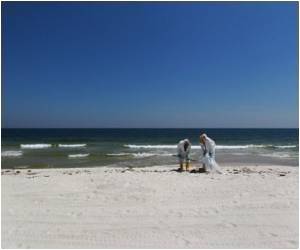Oil spills can increase levels of toxic arsenic in the ocean, according to research published in the journal Water Research.

In their study, a team from Imperial College London has discovered that oil spills can partially block the ocean’s natural filtration system and prevent this from cleaning arsenic out of the seawater. The researchers say their study sheds light on a new toxic threat from the Gulf of Mexico oil leak.
Arsenic occurs naturally in the ocean, but sediments on the sea floor filter it out of seawater, which keeps the levels of naturally occurring arsenic low. However, arsenic is also flushed into the ocean in wastewater from oil rigs and from accidental oil spills and leakages from underground oil reservoirs.
In the study, the researchers discovered that oil spills and leakages clog up sediments on the ocean floor with oil, which prevents the sediments from bonding with arsenic and burying it safely underground with subsequent layers of sediment. The scientists say this shutdown of the natural filtration system causes arsenic levels in seawater to rise, which means that it can enter the marine ecosystem, where it becomes more concentrated and poisonous the further it moves up the food chain.
The scientists say their work demonstrates how the chemistry of sediments in the Gulf of Mexico may be affected by the current oil leak.
Professor Mark Sephton, from the Department of Earth Science and Engineering at Imperial College London, says:
“We can’t accurately measure how much arsenic is in the Gulf at the moment because the spill is ongoing. However, the real danger lies in arsenic’s ability to accumulate, which means that each subsequent spill raises the levels of this pollutant in seawater. Our study is a timely reminder that oil spills could create a toxic ticking time bomb, which could threaten the fabric of the marine ecosystem in the future.”
Advertisements
“We carried out our study before the leak in the Gulf of Mexico occurred, but it gives us a big insight into a potential new environmental danger in the region. Thousands of gallons of oil are leaked into the world’s oceans every year from big spills, offshore drilling and routine maintenance of rigs, which means many places may be at risk from rising arsenic levels, which could in the long run affect aquatic life, plants and the people who rely on the oceans for their livelihoods.”
Advertisements
The team carried out experiments in the laboratory that mimicked conditions in the ocean, to see how the goethite binds to arsenic under natural conditions. They discovered that seawater alters the chemistry of goethite, where low pH levels in the water create a positive change on the surface of goethite sediments, making them attractive to the negatively charged arsenic.
However, the scientists discovered that when they added oil, this created a physical barrier, covering the goethite sediments, which prevented the arsenic in the oil from binding to them. The team also found that the oil changed the chemistry of the sediments, which weakened the attraction between the goethite and arsenic.
In the future, the researchers plan to analyse other minerals such as clays and carbonates that are sediments on the ocean floor. Sediment content varies from ocean to ocean and the researchers will analyse how oil affects their ability to bind to arsenic after a spill.
Meantime a ship billed as the world's largest skimming vessel has begun testing its effectiveness in the Gulf of Mexico, a spokesman for its owner, Taiwanese company TMT Shipping, said Saturday.
The A Whale has been assigned a 5-mile-by-5-mile area to test its capability, spokesman Bob Grantham said, citing Coast Guard Rear Adm. Paul Zukunft. Testing is expected to continue Saturday and Sunday, with initial results probably available Monday, Grantham said.
The skimmer works by "taking in oily water through a series of vents, or jaws, on the side of the ship and then decanting the intake," Grantham said. "In many ways, the ship collects water like an actual whale and pumps internally like a human heart."
The testing area is just north of the underwater oil gusher, the statement said.
Researchers have estimated that between 35,000 and 60,000 barrels (1.5 million to 2.5 million gallons) of oil have been gushing into the Gulf daily since April 20, when the Deepwater Horizon oil rig exploded and sank off the coast of Louisiana.
Over the past few days, bad weather has significantly hampered BP's oil cleanup and collection efforts. Hurricane Alex made landfall in northeastern Mexico late Wednesday, but its impact was still felt in the Gulf days later.
On Friday, more oil than what would fill an Olympic-sized swimming pool slipped by the cap on BP's ruptured undersea well because of the bad weather, Zukunft said.
The cap on the well in the Gulf of Mexico, bouncing in the rough conditions, captured 20,000 fewer barrels (840,000 gallons) of oil than anticipated, Zukunft said.
Source-Medindia









